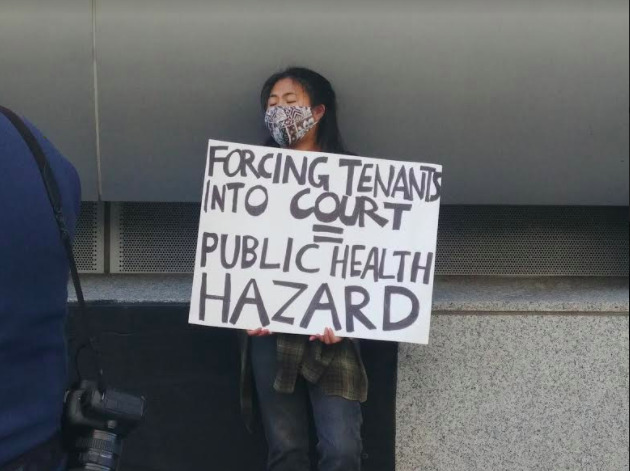Last week, about 30 lawyers and organizers gathered outside the state building at 455 Golden Gate Avenue to demand that the state Judicial Council extend Emergency Rule 1, which prevents courts from issues summons for and making judgments on unlawful detainer cases, and is set to expire on September 1.
“It’s not safe for courts to be open,” said Jacqueline Patton, a staff attorney at the Eviction Defense Collaborative. “Thousands of people will be infected throughout California at court if Emergency Rule 1 is lifted. Imagine if they have a full calendar. Can you imagine the hallways at the courthouse if Emergency Rule 1 is lifted? There will be no way to safely socially distance.”

Indeed, in San Francisco, it is estimated that in a gathering of 25 people, there is a 34 percent chance that at least one person there will have COVID-19, according to an interactive tool developed by Georgia Tech.
California Chief Justice Tani Gorre Cantil-Sakauye, who chairs the state judicial council, has expressed her concern over usurping authority to legislate from the legislature in further extending Emergency Rule 1 beyond September 1. Tom Drohan, an attorney at Legal Assistance to the Elderly, said he disagrees.
“We’re in an emergency, and there’s a legislative vacuum at the moment,” Drohan said. “I think that management and administration of the courts is exactly the Judicial Council’s job. I agree with the basic principles of the separation of powers, and letting the Legislature do their job, but when it’s not getting done, and there’s emergency safety regulations at issue, I think it’s fairly in the judicial council’s order to keep this rule intact and to have it expire in a better fashion.”
Attorneys also warned of an “onslaught” of evictions as eviction lawyers will be unable to meet the demand, in part because attorneys must abide by a legally-mandated “capacity cap” under threat of committing malpractice.
“With the onslaught of evictions that are coming, the number of attorneys are the same,” said Bao-Tran Dang, supervising attorney of the Homeless Advocacy Project at the Eviction Defense Collaborative. “We can’t all of a sudden take more cases even though there will be more eviction cases.”
In addition to a public health risk, Drohan said that reopening the courts would put seniors and low-income people facing eviction disproportionately at risk, as they more often do not have access to computers or the Internet, requiring them to visit the courthouse in person and potentially exposing them to the coronavirus.
Drohan said he’s concerned that getting a balanced, unbiased jury to a trial could be tricky. Jury selection is usually done in-person in the courtroom, and packing 60 or 70 people into a courtroom with no ventilation presents a health risk. Right now, San Francisco courts are moving towards online jury selection, and the lack of accessible computers and Internet for low-income people and seniors could effectively filter them out of the jury selection process and could skew the outcome of an eviction trial.
Given these conditions, Drohan said there must tenants protections beyond Emergency Rule 1, and called for a moratorium on all evictions in San Francisco to protect older clients of his, such as Jesse Wade, a senior who has lived on Oak Street for 44 years until her landlord sought to evict her for having a visitor at her apartment.
“Ms. Wade is a senior…this is the kind of crap we don’t need right now. She shouldn’t have to come down here and spend her morning in a mask in a courtroom to get evicted,” said Drohan. “If we buy into shelter in place as a method of dampening COVID-19, why do we have the courts not encouraging that we follow that? There’s no reason to have a nonpayment of rent case. There’s no reason to have a ‘you broke the lease because you had roommates’ case. We’re in a pandemic…There needs to be a moratorium [on evictions] for at least 90 days,” said Drohan.
What’s more, San Francisco has tenant protections that most other California cities don’t have, such as a moratorium on non-payment of rent eviction cases. Many other cities will face a large number of evictions for any reason, including non-payment of rent, which will exacerbate homelessness in those areas. Such is the case in Santa Clara, where there could be an enormous wave of evictions after August, as reported by KQED.
According to US Census Bureau data, 1.7 million people have no confidence of paying August rent as of the week of July 21.
In light of this dilemma, Sarah Sherburn-Zimmer, director of the Housing Rights Committee, said that Emergency Rule 1 is not enough to protect tenants in San Francisco, and that the California state government needs to enact a moratorium on all evictions and forgive rent during the pandemic.
“This rule is not enough. What we need to do is stop evictions throughout the state. We don’t need to just postpone them, we need to stop them during the pandemic,” said Sherburn-Zimmer. “This pandemic isn’t going away, and we can’t put landlords’ profits over people’s lives.”






